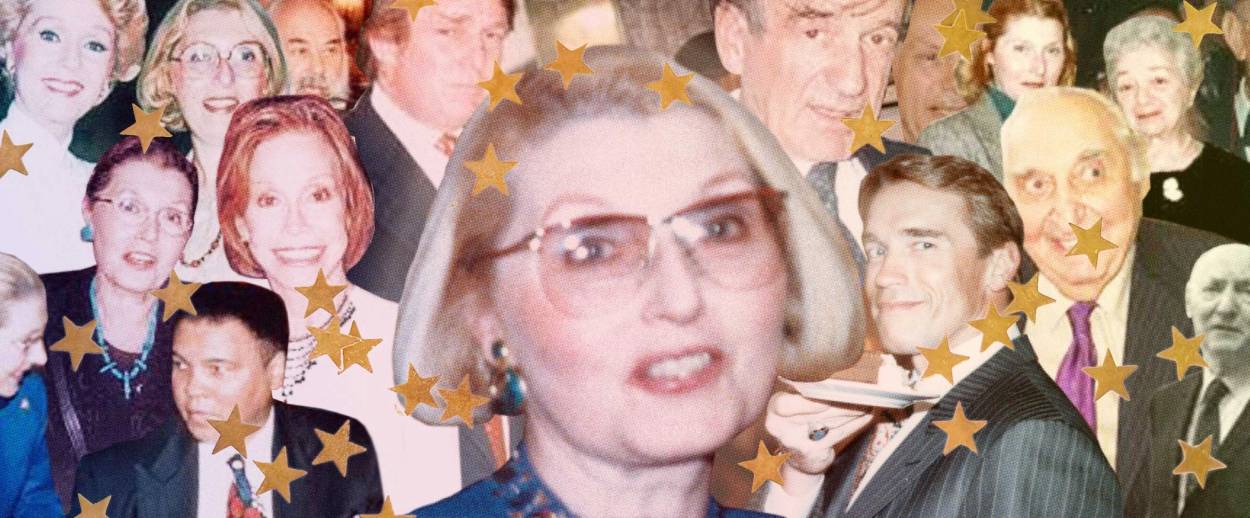Welcoming Masha Leon to Tablet
Our newest columnist brings her legendary society pieces to The Scroll




Fifteen years ago this spring, on the cusp of graduating from journalism school, I landed a summer internship at The Forward, the English edition of the historic Yiddish newspaper. This was big news for my parents, who were (in their telling, at least) “charter subscribers” to the paper, which was founded in 1990 by Seth Lipsky.
The staffers at the paper were less enthusiastic. It’s not that they were mean or rude; they were simply—as all good journalists always should be—on deadline. During my first days, I made a few attempts to grab this or that assignment, but it soon became clear that the wiser strategy was to stay out of people’s way and wait for a moment when I could be of some actual help to someone.
One afternoon, I was reading quietly at my desk near the front door when an elegant woman with a short blond ponytail and maroon lips fluttered in. She stopped, looked straight at me and said, “Hello, I’m Masha.” I knew very well who she was, having spent years looking at pictures of her in the paper’s gossip column, alongside everyone from Elie Wiesel to Queen Latifah.
Masha was a legend in her own right, with a story and a legacy that matched any of her interviewees’. During World War II, Leon’s father, the Polish journalist Matvey Bernstein, was imprisoned for his anti-Communist sympathies, while she and her mother, Zelda Bernstein, escaping Nazi-occupied Warsaw, were hidden by a Polish Catholic woman until they could continue their flight. She and her mother eventually wound up in Lithuania, where they were among the lucky 6,000 Jews to receive visas from Japanese Consul Chiune Sugihara. After the war, they landed in the United States, where Leon later began work as a journalist for the Yiddish Forward.
“What’s your name?” Leon asked me.
“I’m Alana, but I’m only an intern.”
“Well, I’m only Masha! Welcome aboard.”
And so, it is my once-in-a-lifetime honor to announce that, as of this week, Masha Leon will be a columnist for Tablet, contributing her signature on-the-town pieces for our readers.
In advance of making this announcement, I reached out to Lipsky, who first assigned Leon to write a weekly social gossip column. She jumped at the chance, with one proviso: that she would never disclose information that would compromise anyone’s privacy and good name. If that seems like the opposite of what an editor should expect from a good gossip columnist, well, you don’t know Masha—who is as beloved as she is respected.
“She’s turned out one jewel after another,” Lipsky told me. “It’s a wonderful genre, and she’s one of the greatest at it.”
“Oh,” he added, “and don’t forget to ask her about the role she and her mother played in establishing the state of Israel.”
So I did.
Masha told me that in August 1940 in Vilna, her father “was arrested in my presence” by the predecessor to the KGB. “My mother and I went to Lukishki prison a day later with a package of warm clothing for what we assumed would be his long Siberian sojourn. A young newlywed woman in line next to us told my mother that she was sending a message to her husband on a piece of paper stuffed into a bar of soap to let him know she was making aliyah.
“My mother warned the newlywed that the authorities might cut open the soap, find the note and her husband would be punished. My mother suggested that instead she should embroider a coded message on a handkerchief—no one would suspect anything, since embroidery was commonplace. My mother and I never knew who the young woman was.”
Decades later came Menachem Begin’s memoir—White Nights—about his years in Russia. Masha was astounded to read of his “friendship with a man named Bernstein.” This man was not a Zionist, Masha notes, but “he helped the future prime minister unlock the code of the embroidered handkerchief” that had been sent into the prison by his wife, Aliza.
“That was my father!” Masha exclaimed. “It was ‘Talmudist Bernsztein,’ as Begin describes, who figured out that Aliza’s name in Polish is ‘Ola’ and that Ola in Hebrew means aliyah—that she was telling him that she was heading to Palestine.
Masha reminded me that in the book, Begin also writes that he considered divorcing his wife lest, if he died in prison or Siberia, she become an agunah. “Apparently, my father dissuaded him by arguing that, were he also to do that, my mother might not try to save herself and me—which presumably would be true of Aliza as well.”
Years later when Aliza came to New York, Masha told Mrs. Begin the story of how they had “first met in front of Lukishki prison.” Later—at a gala dinner—Masha told the story to their son, Benny Begin, who got a bit teary-eyed and said to her: “Were it not for your father, I might never have been born!”
Lipsky’s theory is that the knowledge that Aliza would be in Israel was one of the things that sustained Begin in his epic journey, above and below ground, to get from the Gulag Archipelago to Palestine, where he led the revolt against the British and set the stage for independence. Then again, a lot of things might not have happened were it not for this wonderful woman and her magnificent parents.
And so, Masha, it’s my turn now: I’m only Alana. Welcome aboard.
Alana Newhouse is the editor-in-chief of Tablet Magazine.